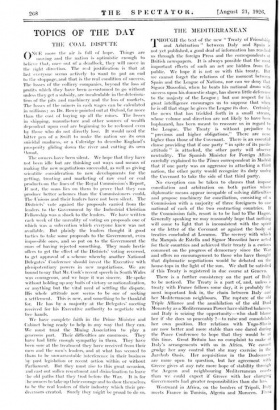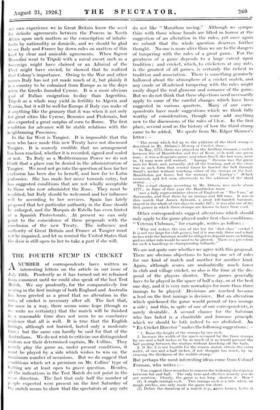THE MEDITERRANEAN
THOUGH the text of the new "Treaty of Friendship and Arbitration " between Italy and Spain is not yet published, a good deal of information has readied us through the foreign Press and the correspondents of British newspapers. It is always possible that the most important effects of such an act are hidden from the public. We hope it is not so with this treaty. But we cannot forget the relations of the moment between Spain and the League of Nations, not can we deny that Signor Mussolini, when he beats his national drum with success upon his domestic stage, has shown little deference to the majesty of the League ; but our respect for his great intelligence encourages us to suppose that when be is off that stage he gives the League its due. Certainly the news that has trickled forth in a small stream, whose volume and direction are not likely to have been haphazard, has been meant to reassure us in regard to the League. The Treaty is without prejudice to " previous and higher obligations." There are none higher than those of the Covenant. There is an essential clause providing that if one party " in spite of its pacific attitude " is attacked, the other party will observe neutrality. The Spanish Minister for Foreign Affairs carefully explained to the Times correspondent in Madrid that if one party was an aggressor in attacking a third nation, the other party would recognize its duty under the Covenant to take the side of that third party.
No exception can be taken to clauses that impose conciliation and arbitration on both parties where diplomatic means appear incapable of solving difficulties and propose machinery for conciliation, consisting of a Commission with a majority of three foreigners to one national of each of the two contracting countries. If the Commission fails, resort is to be had to The Hague. Generally speaking we may reasonably hope that nothing will come to light that is inconsistent with the spirit or the letter of the Covenant or against the body of treaties concluded at Locarno. The secrecy with which the Marquis de Estella and Signor Mussolini have acted for their countries and achieved their treaty is a curious comment on the progress of democracy since the War and offers no encouragement to those who have thought that diplomatic negotiations would be debated on the house-tops in the light of the sun. We shall be satisfied if this Treaty is registered in due course at Geneva.
There is a further consistency on the part of Italy to be noticed. The Treaty is a part of, 'and, unless a treaty with France follows some day, it is probably the most important link in, the chain between Italy and her Mediterranean neighbours. The rupture of the old Triple Alliance and the annihilation of the old Dual Monarchy as a Mediterranean Power have shifted balances, and Italy is seizing the opportunity—who shall blame her if she does so peaceably ?—to raise and consolidate her own position. Her relations with Yugo-Slavia are now better and more stable than one dared during the Peace Conference to hope that they would be at this time. Great Britain has no coniplaint to make of Italy's arrangements with us in Africa. We cannot grudge her any control that she may exercise in the Jarabub Oasis. Her acquisitions in the Dodecanese are more open to question, but her agreement with Greece gives at any rate more hope of stability 'through the Aegean and neighbouring Mediterranean coasts than we could expect if Greece with her changing Governments had greater responsibilities than she has.
Westward in Africa, on the borders of Tripoli, Italy meets France in Tunisia, Algeria and Morocco. From our own experience we in Great Britain know the need for definite agreements between the Powers in North Africa upon such matters as the conscription of inhabi- tants by nationality or domicile, and we should be glad to see Italy and France lay down rules on matters of this kind by clear and amicable agreements. When Signor Mussolini went to Tripoli with a naval escort such as a Sovereign might have claimed or an Admiral of the Fleet might have envied, he showed that he realized that Colony's importance. Owing to the War and other causes Italy has not yet made much of it, but plainly it is a country to be colonized from Europe as in the days when the Greeks founded Cyrene. It is a more obvious goal of Italian emigration to-day than Argentina. Tripoli as a whole may yield in fertility to Algeria and Tunisia, but it will be well for Europe if Italy can make of it anything like the granary that it was when it not only fed great cities like Cyrene, Berenice and Ptolemais, but also exported a great surplus of corn to Rome. The first condition for advance will be stable relations with the neighbouring Provinces.
In the far West is Tangier. It is impossible that the men who have made this new Treaty have not discussed Tangier. It is scarcely credible that no arrangement has been reached, whether it is recorded, signed and sealed ;a- not. To Italy as a Mediterranean Power we do not think that a place can be denied in the administration of Tangier. We need not go into the question of how far her exclusion has been due to herself, and how far to Latin jealousies. She has made her move towards entry, but has suggested conditions that are not wholly acceptable to those who now administer the Zone. They must be modified, but Italy should be welcomed and her influence will be according to her services. Spain has lately prvosed that her particular authority in the Zone should be enlarged, and the Marquis de Estella has even hinted at a Spanish Protectorate. At present we can only point to the coincidence of these proposals with the conclusion of the new Treaty. The influence and authority of Great Britain and France at Tangier must w)t be impaired, and let us remind the United States that the door is still open to her to take a part if she will.



































 Previous page
Previous page